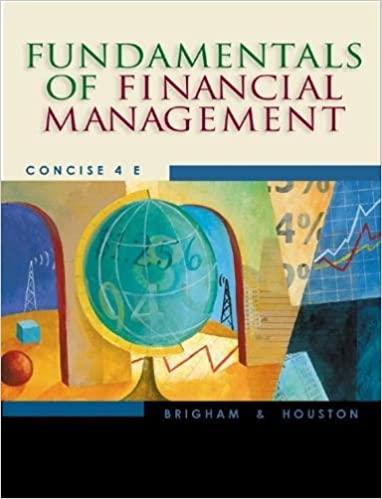Question
HRM4200 Project Team and Stakeholder Management Read the following case study and answer the questions in the spaces following the questions below. Mayflower Autonomous Ship
HRM4200 Project Team and Stakeholder Management
Read the following case study and answer the questions in the spaces following the questions below.
Mayflower Autonomous Ship
Inspired by a voyage from centuries ago, marine researchers and climate scientists teamed with tech titans like IBM to showcase how crewless vessels can help protect and preserve oceans. The goal of the US$1.3 millionMayflower Autonomous Ship(MAS) project? Spark a new era of ocean research that will help scientists analyze information more efficiently. "To understand our oceans of the future, we really need to collect as much data as possibleand that's something that autonomous vessels will really allow us to do," says Rosie Lickorish, software engineer, IBM, Southampton, United Kingdom.
More than 400 years after pilgrims crossed the Atlantic in the original masted Mayflower to establish a U.S. colony, the MAS team aimed to retrace the route. But this time around, the trip was made in a
small vessel powered largely by solar panels and a wind turbinesans any human crewmembers but loaded with AI and machine learning capabilities.
To create the vessel, nonprofit marine research organizationProMarecollaborated with theUniversityof Plymouth, and IBM providing tech reinforcements, like servers, AI, cloud services andedgecomputing. The team packed the ship with three research pods and an array of sensors and other gadgets so it could probe issues such as maritime cybersecurity, marine mammals, sea-level mapping, and the impact of ocean plastics.
The project also aligns with the United Nations'Decade of Ocean Science for Sustainable Development, which aims to reverse a decline in ocean health. Along with capturing and analyzing data on things like the ocean's temperature, salinity, oxygen, pH and pollutants in the water, the team collected underwater audio streams and use video to study the large-scale currents and surface flows of the ocean.
"We wanted to build something that could create informationusing edge computingfrom vast amounts of data that it gets, send that information back and drive the cost down," says Brett Phaneuf, project director and ProMare co-founder. "That way we could sort of democratize ocean and climate science, because we can give these tools away for free. And then anybody can build a ship."
Knowing that threats like storms and connectivity issues could impact any project voyage, Phaneuf made sure the team integrated risk management from the start. "When you deal with the ocean, everything you put in it or on it has a very high likelihood it's not coming back," he says.
Project partners identified as many scenarios as possible and then iterated their way to a vessel that was up to the job. For example,Marine AIhandled the design of the software in partnership with IBM and with support fromNVIDIA, developing a virtual navigator called A.I. Captain.MSubsused aluminum and composite materials to create a ship that's lightweight but can stand up to the ocean's punishing waves. And Iridium's satellite communications system helps the vessel stay hyperconnected so it can generate nonstop, real-time data.
The ship's first mission last year was aborted after three days because of mechanical problems. Unbowed, the team completed several sea trials before achieving its first transatlantic crossing on June 5 a 40-day trip that spanned approximately 3,500 miles (5,633 kilometers).
Through it all, the team's agility and innovative thinking overcome any waves of disruption. Most notably, when technical problems resurfaced near the end of the ship's voyage, project leaders changed course. Instead of docking the ship at the planned U.S. port in Massachusetts, the team diverted it to Halifax, Nova Scotia, Canada.
Yet the successful crossing was just the startthe team plans to have the ship explore other oceans and coasts as it conducts climate research.
"There's still things to be discovered," Phaneuf says. "If we have a zero-risk philosophy as the criteria for doing new things, we are doomed."
Case Study Questions
Please answer the questions below in the space following the question. You may take as much space as you require to comprehensively answer all parts of the question. Questions are worth 2 points each and will be graded as follows:
Question #1:describe the project management principle, Effectively Engage with
Stakeholders. How would you apply this principle if you were the project manager for the Mayflower Autonomous Ship project? (200-300 words)
Question #2:describe the project management principle, Create a Collaborative
Project Team Environment.How would you apply this principle if you were the project manager for the Mayflower Autonomous Ship project? (200-300 words)
Question #3:Create a stakeholder register identifying at least six (6) stakeholders for the Mayflower Autonomous Ship project. Conduct a stakeholder analysis of your choice. (200-300 words)
Question #4:Describe how you would design the governance structure for the Mayflower Autonomous Ship project. Explain why you would design it this way. (200-300 words)
Question #5:Describe how you would structure your Mayflower Autonomous Ship project team. What are your team member requirements? (200-300 words)
Question #6:Describe, as the project manager, how you would create a collaborative team environment.
(200-300 words)
Question #7:Create a project communication plan for the Mayflower Autonomous Ship. Include at least six (6) unique communication activities, plus one (1) change management activity. (200-300 words)
Step by Step Solution
There are 3 Steps involved in it
Step: 1

Get Instant Access to Expert-Tailored Solutions
See step-by-step solutions with expert insights and AI powered tools for academic success
Step: 2

Step: 3

Ace Your Homework with AI
Get the answers you need in no time with our AI-driven, step-by-step assistance
Get Started


